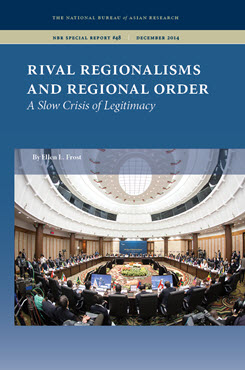NBR Special Report no. 48
Rival Regionalisms and Regional Order
A Slow Crisis of Legitimacy
This NBR Special Report analyzes the emergence of rival regionalisms in Asia and argues that recent economic and security developments threaten to fragment Asia’s institutional landscape, erode regional stability, and undermine Asian confidence in the legitimacy of the institutions and values underpinning the existing liberal economic order.
EXECUTIVE SUMMARY
MAIN ARGUMENT
Recent economic and security developments threaten to fragment Asia’s institutional landscape, erode regional stability, and undermine Asian confidence in the legitimacy of the institutions and values underpinning the existing liberal economic order. “Rival regionalisms”—new or re-energized regional groupings initiated or heavily supported by China and Russia—are on the rise. Their goals include providing alternatives to U.S.-led institutions, thereby avoiding Western-backed conditionality and reducing U.S. influence. As a result, a slow crisis both of regional and global order and of institutional legitimacy is emerging.
POLICY IMPLICATIONS
- Top U.S. officials, including the president, should work to rebuild the legitimacy of regional and global institutions. The White House needs to devote far more effort to building a congressional consensus in support of legislation to reform the International Monetary Fund and comparable institutions. The first priority should be expanding the voting power of China and other emerging powers, without conditions.
- Concluding and ratifying the Trans-Pacific Partnership (TPP) and reauthorizing trade promotion authority are geopolitical imperatives for the U.S. Some degree of compromise will be required. The president and his top officials should make the case for the TPP on broadly defined geopolitical and national security grounds, not just for economic and commercial reasons.
- The U.S. should not oppose China’s organizational initiatives or try to block other countries from participating in them. Instead, Washington should fully implement the economic component of its rebalancing policy and expand the use of soft-power tools.
This report from the Strategic Asia Program draws on research conducted for the NBR project “Strengthening the Asia-Pacific Order: The Future of U.S. Alliances and Partnerships.”



